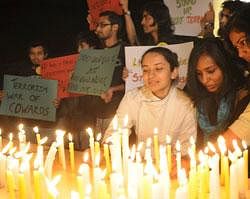For Kavita Karkare, wife of the slain Maharashtra Anti-Terrorist Squad chief Hemant Karkare, the day has left a deafening silence. "There is still a trace of shock in the voices of my three children when they speak of their father," she told IANS.
"But what shocks me more is the apathy of the government. Our 'great politicians' had made tall claims that the security system has been strengthened and no such attack will take place again. But the blasts in July exposed their so-called security. It is depressing," she said.
She was referring to the terror blasts in three Mumbai places July 13 this year that claimed 27 lives and brought back memories of 26/11. Karkare's two daughters - one a software engineer in the US and another a peace activist working for the United Nations in Vienna - seem to have taken the bitter dose in their stride.
But her 20-year-old son who is studying law is looking forward to fighting terror in his own way. "He doesn't discuss his ideas with me in detail; it is too painful for all of us," Kavita Karkare said.
Hemant Karkare was one of the 166 people killed in the attack at prominent Mumbai locations by 10 Pakistan-based terrorists three years ago. For 31-year-old Baby Chowdhary, life is an everyday struggle. Baby's husband Shyamsunder used to work in a biscuit factory in suburban Vile Parle until he was grievously injured in the bomb blast which annihilated the taxi the terrorists used during the attack.
"My husband suffered multiple injuries and developed a brain disability that left him paralysed. He still gets disturbed if he accidentally watches bomb blast related clips or movies. He has become too sensitive and over-alert," Baby said.
"There are still times when he shudders remembering the incident. He is flustered all the more because he cannot speak. He had started crying like a baby when he heard about the July 13 blasts at Opera House and Zaveri Bazar," she added.
Columnist Bhisham Mansukhani, 33, who escaped the attack at the Taj Hotel, says it is the media that keeps reminding him of the attack. "Not many people in my social circle remind me of the horror of 26/11. But I do get agitated sometimes thinking of what happened then," he said. Talking about the government's action on terrorism - or inaction as he calls it - he says he is completely at a loss for words over the July blasts.
"I am not really surprised with the July 13 bombings. I am surely shocked that many more people suffered the fate we did in 2008, but this is what we can expect when all our ministers know is to play the blame game," he quipped.
Bharat Gujjar, 34, who used to man the counter at Leopold Café, one of the 26/11 attack sites, feels life must go on, but he has become more careful. "I cannot describe the thoughts I had started having when the grenade burst near me. I had to be operated upon and my stomach received 14 stitches," he said.
"I have now learned to survey any crowded place, train or bus before making myself comfortable there. This is the lesson I have learnt," he added. Assistant police inspector Sanjay Govilkar, who along with colleague Tukaram Ombale literally wrestled with Kasab and caught hold of him, is now part of an NGo he started with some friends.
"Our NGO takes up various causes like cremating dead bodies, holding blood donation drives and bringing together Indians, not as communities, but as citizens of the entire nation," he added.
A bust of Ombale will be inaugurated Nov 26 at a prominent location at Girgaum Chowpatty in south Mumbai. For some, life reminds them daily of that day and they seethe with rage, especially at the thought of Ajmal Amir Kasab - the only 26/11 attacker who was caught alive - still living.
For Mohammed Hanif Peer Mohammed, 62, it is an everyday ordeal to see his widowed sister - his brother-in-law fell to the terrorist bullets at the Chhatrapati Shivaji Terminus.
Said Mohammed, "Kasab killed my sister's husband. He should be hanged in public."
